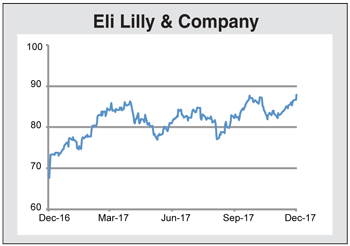Eli Lilly (LLY) is our favorite big pharma stock, with a diversified portfolio of more than two dozen drugs, none accounting for more than 13% of sales, asserts Scott Chan, editor of The Complete Investor.
On a trailing 12-month basis, revenues topped $22 billion and per-share earnings were more than $3.50. Six drugs, led by diabetes treatments Humalog and Trulicity, generate annual sales of at least $1 billion.
Humalog, taken at mealtime to keep blood sugar low, has been around since the 1990s and was the first insulin analog to enter the market. Trulicity, introduced in late 2014, stimulates the body to release insulin. Its sales are expected to climb 33 percent in 2018, to $2.6 billion. Trulicity also is being tested to treat heart disease, with data expected in 2018.
Lilly has been deft at replacing drugs facing patent expiration. Five of its blockbusters – annual sales of $1 billion or more – are mature drugs: Humalog, Alimta (lung cancer), Forteo (osteoporosis), Humulin (synthesized insulin), and Cialis (erectile dysfunction).
Lilly sales dipped a few years back after its star drug, antidepressant Cymbalta, lost exclusivity. But although Cymbalta revenues dropped from above $5 billion in 2013 to about $730 million in 2017, Lilly’s overall 2017 revenue will be just $500 million below 2013’s level as new drugs picked up the slack.

Five Lilly drugs launched in 2014 or later should surpass $1 billion a year in sales in the next few years. Besides Trulicity, they are Jardiance (shown to reduce heart attacks and strokes in diabetes patients), Taltz (plaque psoriasis), Basaglar (insulin), and Cyramza (certain gastric and lung cancers).
Lilly will soon launch recently approved breast cancer oral pill Verzenio. Unlike competing drugs, it can be taken either on its own or in combination with other medications, and on a continuous rather than cyclical schedule.
Lilly also has just applied to the FDA to review galcandezumab (migraine headaches). Earlier in 2017 it resubmitted an application for Olumiant (rheumatoid arthritis). The company has more than 15 ongoing phase 3 clinical studies, a dozen in phase 2, and many more in phase 1.
Lilly may sell or spin off its relatively low-margined animal health division Elanco, likely resulting in a special dividend for shareholders and improving overall profit margins.










